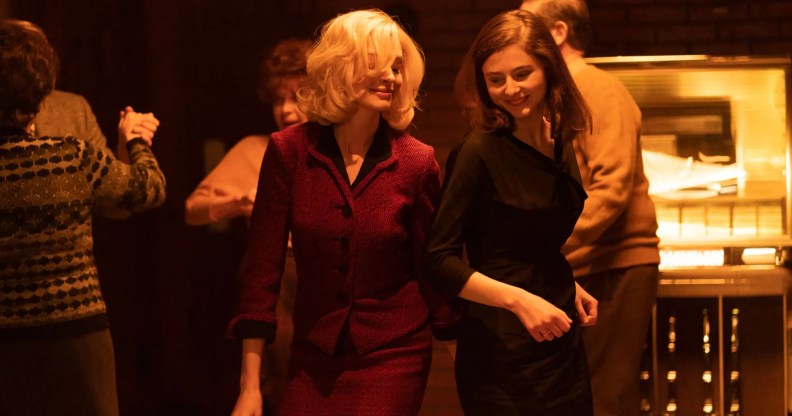Eileen review: Anne Hathaway pulls focus in unsettling queer thriller

Anne Hathaway as Rebecca (L) and Thomasin McKenzie as Eileen (R). (Sundance Institute)
Anne Hathaway as Rebecca (L) and Thomasin McKenzie as Eileen (R). (Sundance Institute)
Adapting a critically-acclaimed, Booker Prize-shortlisted novel for the big screen will always come with immense challenges.
In some cases, it’s largely successful – think Matthew López’s Red, White & Royal Blue, which became the queer rom com of the summer (even if it did have to strip the book of a whole main character in order to cram the storyline in). And All of Us Strangers, with Paul Mescal and Andrew Scott, based on the 1987 novel Strangers, which has so far received rave reviews.
Then, there are those stories that, frankly, should have stayed confined to their pages: The Scarlet Letter, The Great Gatsby, and dare we say it, Killing Eve (season four, that’s on you).
In the case of Eileen, William Oldroyd’s film version of Ottessa Moshfegh’s quietly queer 2015 novel of the same name, success is achieved – almost.
Leave No Trace star Thomasin McKenzie plays the titular character Eileen Dunlop, a “plain” 23-year-old secretary working at a juvenile detention facility in 1960s Massachusetts.
Outwardly, she lives a life as plain and as dull as her exterior: she cares for her drunkard father, fantasises about the hot male security guard she works with, and spends her evenings alone.
Like the book, the film traces the last week of Eileen’s life in her small hometown, following the arrival of an alluring new psychiatrist at work.
Rebecca Saint John, played by The Devil Wears Prada icon Anne Hathaway, is conventionally beautiful, inquisitive and glamorous, and sets Eileen’s lonely world aflame with the promise of friendship and excitement.

Eileen swiftly becomes enamoured by Rebecca’s attention, but the newcomer’s obsessions lie elsewhere. Rebecca is determined to achieve justice for one of the young boys in the detention centre, Lee Polk, by any means necessary.
While Oldroyd follows the overarching plot put in place by Moshfegh, there is one small issue. Moshfegh’s Eileen Dunlop is, internally, intriguingly odd and occasionally grotesque – it’s this element that makes the story so enticing. She’s fascinated by her own bowel movements, enjoys being unwashed, and is often preoccupied with sexual or morbid fantasies, though these play out almost entirely in her head.
Oldroyd has made a good effort to communicate some of that internal monologue on screen. Within the film’s first few minutes, McKenzie’s Eileen has stuffed her underwear with snow to cool down her own horn, while there are several scenes where she imagines brutally murdering her belligerent father.
Yet the engrossing inner workings of Eileen’s mind are not quite, well, gross enough. In Oldroyd’s version, she is more moody teenager than peculiar recluse (though Moshfegh has previously said she believes the character is “totally normal”).
Where the director has been unable to translate Eileen’s thoughts onto the screen, he’s tried to make up for it in other ways, with varying degrees of success. The film maintains its chill factor with an ominous, orchestral musical score, though it feels overly relied upon at times.
McKenzie is impressive, working well with what she’s been given, while Hathaway is as convincing as ever in her role as the charming Rebecca – oddly becoming the film’s scene-stealing character, despite its title.
Together, their chemistry is magnetic, though it’s Mrs Polk, mother of the boy at the detention centre and played by Tony Award-nominee Marin Ireland, who gives arguably the best performance of the film at its climax.
Eileen is enjoyable, fast-paced (it’s one for those in the “films shouldn’t be longer than an hour and a half” camp), and arguably more explicitly queer than the novel, as Eileen’s infatuation with Rebecca is clear to see.
It’s also frequently funny, with Eileen’s oddball tendencies bringing laughs whenever they do get aired. If the character had been allowed to lean further into those off-kilter impulses, Eileen would have been one to truly remember.
Eileen will be released in cinemas on 1 December.

